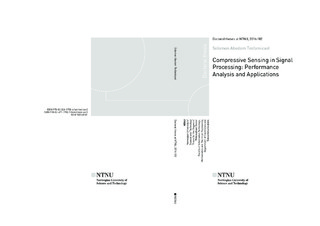Compressive Sensing in Signal Processing: Performance Analysis and Applications
Doctoral thesis
Permanent lenke
http://hdl.handle.net/11250/2399472Utgivelsesdato
2016Metadata
Vis full innførselSamlinger
Sammendrag
This thesis deals with an emerging area of signal processing, called Compressive Sensing (CS), that allows the reconstruction of sparse or compressible signals from fewer measurements than are used in traditional schemes. Like traditional signal representation schemes, CS follows a similar framework: encoding, transmission/storing, and decoding. The encoding part is done using random projection (RP) or random sensing, and the decoding is done via nonlinear reconstruction algorithms from a reduced amount of measurements. The performance of the reconstruction schemes used and the application of such paradigm are the two main focuses of the thesis. It has three parts: the introduction, performance analysis of recovery algorithms in CS and some applications of CS.
The introductory part provides the background for the following four chapters. It begins by defining the basic concepts used in CS theory and presents the Bayesian framework. Further, an analytical tool from statistical mechanics for performance analysis of physical systems is introduced applied on a non-noisy CS problem. The Bayesian framework is given ample emphasis in the thesis for two reasons. First, it serves as a bridge between the recovery algorithms used in CS and a tool from the statistical mechanics, called the replica method. Second, it is used as main framework to incorporate different prior signal information, like sparsity and clusteredness. Furthermore, a short description of CS applications is given before the introduction concludes by presenting the scope and the contribution of the thesis.
The second part of the thesis deals with the study of the performance of recovery methods in CS systems using the Replica Method. At the beginning, the study of the performance of the recovery algorithms in CS was focused on the ratio of the amount of measurement used, the sparsity level, and how accurate the recovered information is. However, there was a luck of universal performance analysis. The Replica method provides this by considering large size systems. This thesis contributes to such analysis via the Bayesian framework. In this work noisy CS systems are considered and the recovering algorithms are reinterpreted as a maximum a posteriori (MAP) estimator. It, therefore, provides replica analysis including one step replica breaking ansatz for CS systems as an extension of similar analysis done for other systems like multiple input/multiple output (MIMO).
The CS application is the third part of the thesis. The theory of CS has been applied in many signal processing fields such as image processing, communication, networks and so on. There are hundreds, if not thousands of articles on this subject at present. In this thesis, there are novel results that contribute to the application of CS theory. The theory is applied to limited feedback in temporally correlated MIMO channels, where the sparsity property was used to reduce feedback overhead significantly while delivering the same performance. Further, including another assumption, i.e., more structure among the sparse entries, to the sparsity of signals, and modeling it as a modified Laplacian prior in Bayesian setting, a novel way of compressive sensing is presented in this thesis. It can have potential impact on medical imaging processing, especially to magnetic resonance imaging (MRI).
Består av
Tesfamicael, Solomon A. "Compressive Sensing Performance Analysis via Replica Method using the Bayesian Framework" International Journal of Simulation Systems, Science & Technology (IJSSST), vol. 16, no. 3, 2016. DOI 10.5013/IJSSST.a.16.03.16Tesfamicael, Solomon Abedom; Barzideh, Faraz; Lundheim, Lars Magne. "Improved Reconstruction in Compressive Sensing of Clustered Signals." IEEE AFRICON 2015 http://dx.doi.org/10.1109/AFRCON.2015.7331947 (c) 2016 IEEE. Personal use of this material is permitted. Permission from IEEE must be obtained for all other users, including reprinting/ republishing this material for advertising or promotional purposes, creating new collective works for resale or redistribution to servers or lists, or reuse of any copyrighted components of this work in other works.
Tesfamicael, Solomon Abedom; Faraz, Barzideh. "Clustered Compressed Sensing Via Bayesian Framework. UKSim-AMSS 17th International Conference on Modeling and Simulation" (c) 2016 IEEE. Personal use of this material is permitted. Permission from IEEE must be obtained for all other users, including reprinting/ republishing this material for advertising or promotional purposes, creating new collective works for resale or redistribution to servers or lists, or reuse of any copyrighted components of this work in other works.
Tesfamicael, Solomon Abedom; Lundheim, Lars. "Compressed Sensing Based Rotative Quantization in Temporally Correlated MIMO Channels." Proceedings of Recent Developments on Signal Processing (RDSP) 2013
